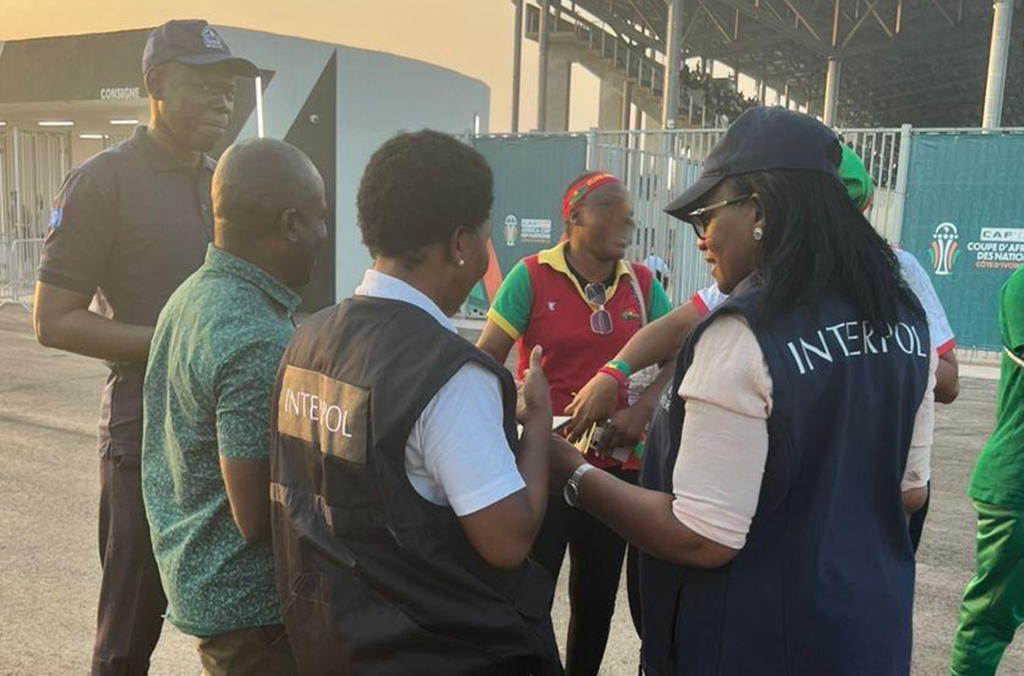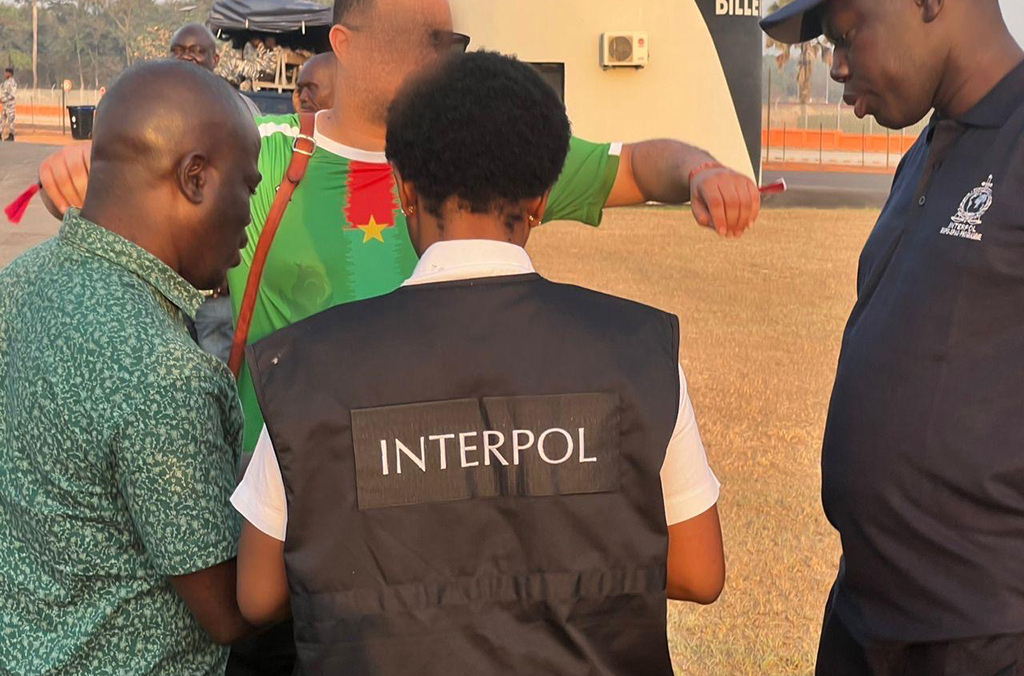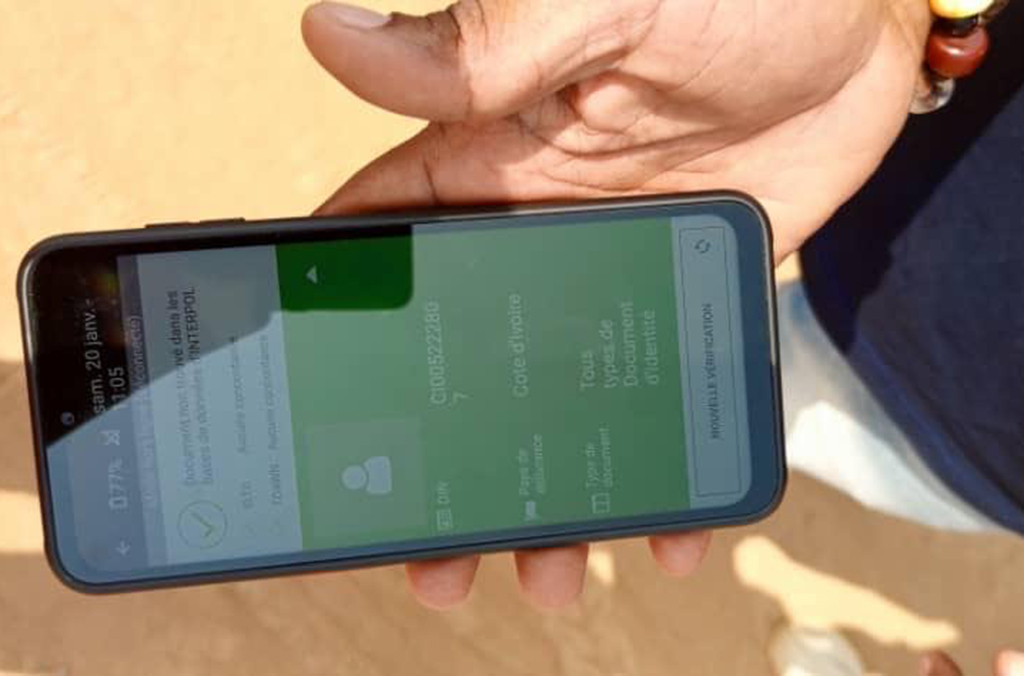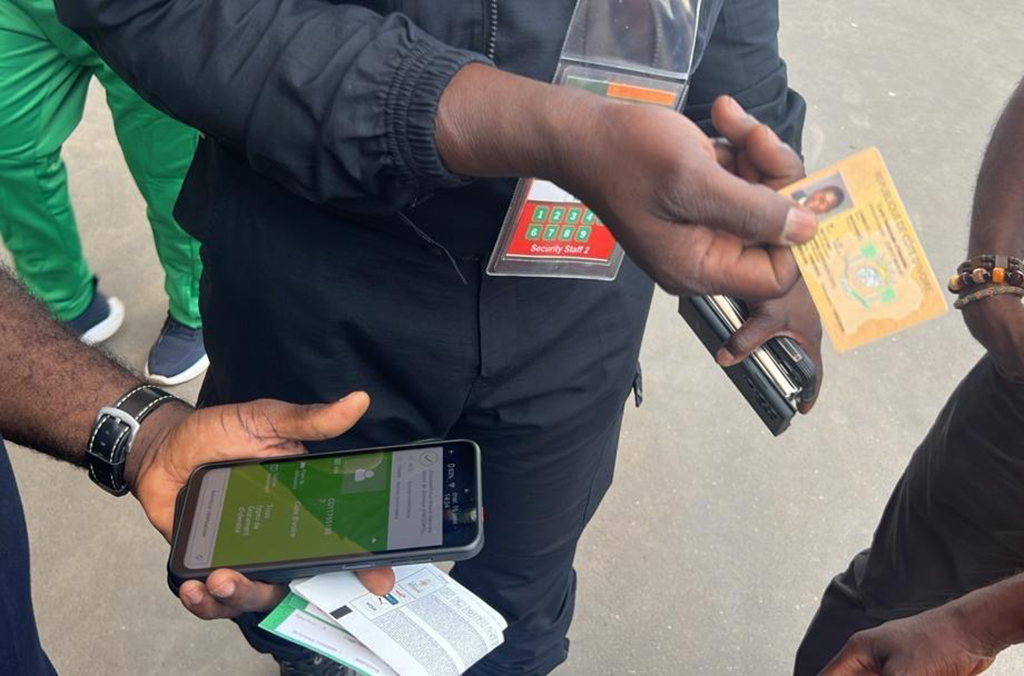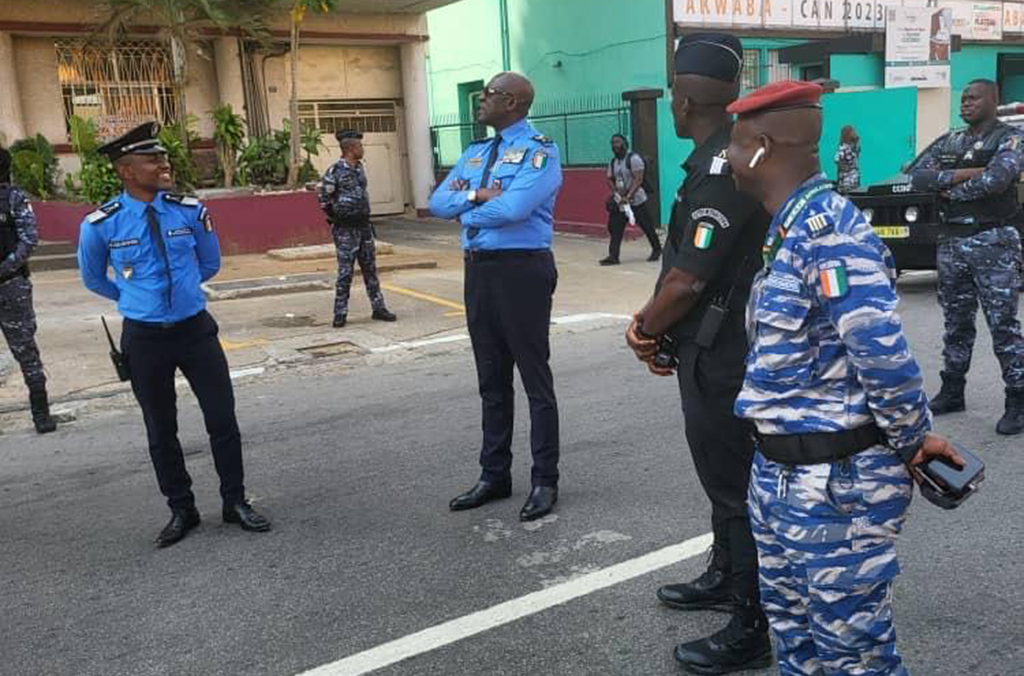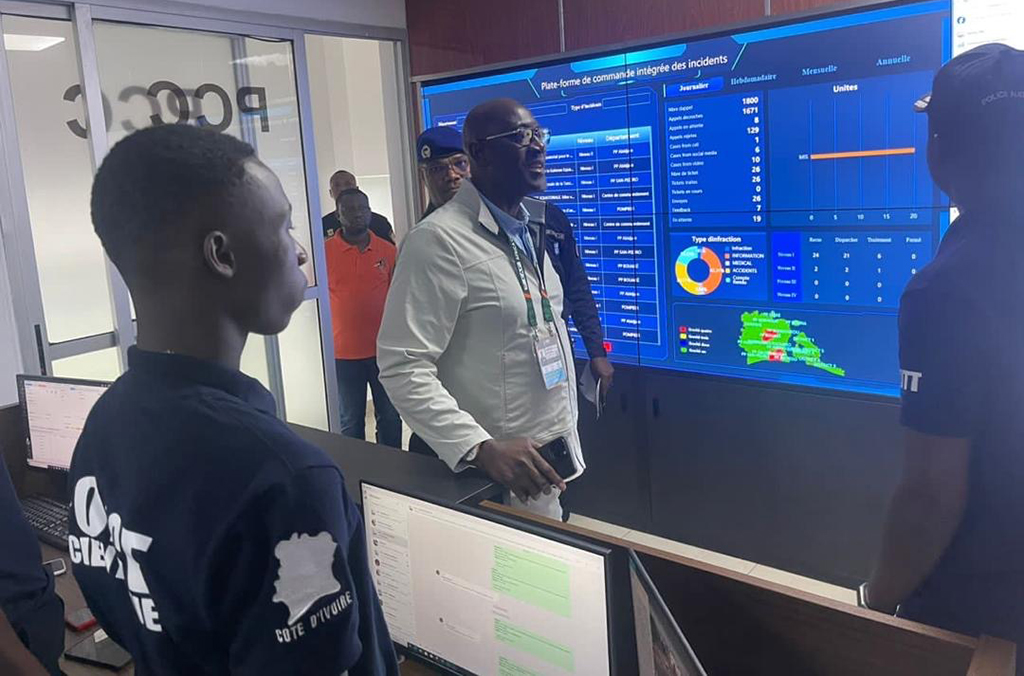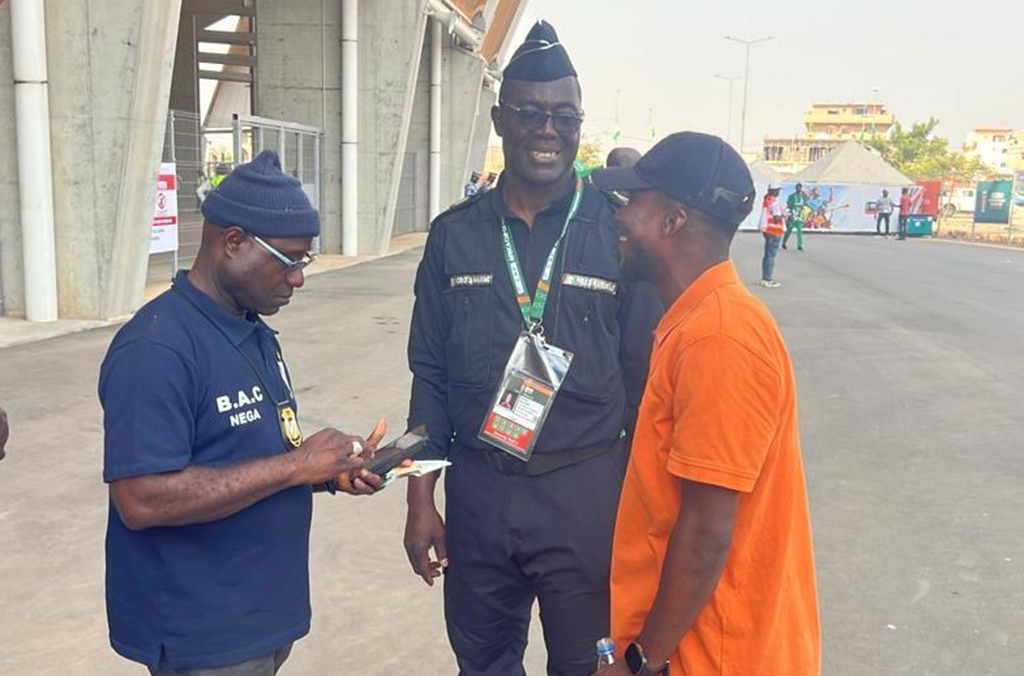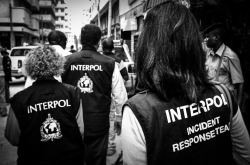ABIDJAN (Côte d’Ivoire) – INTERPOL a déployé une équipe spéciale d’appui au renseignement dans une zone à haut risque de terrorisme en Afrique de l’Ouest pour aider la Côte d’Ivoire à assurer la sécurité de la Coupe d’Afrique des nations (CAN).
Du 13 janvier au 11 février, la Coupe d’Afrique des nations mettra en compétition 24 équipes nationales de football en Côte d’Ivoire dans les villes d’Abidjan, de Bouaké, de Korhogo, de San Pedro et dans la capitale, Yamoussoukro.
Afin de rendre cet événement aussi sûr que possible pour les trois millions de personnes se rendant en Côte d’Ivoire pour y assister, la police locale collabore avec INTERPOL pour veiller à ce que les officiers de première ligne soient dotés des bases de données mondiales d’INTERPOL pour repérer les personnes dangereuses au niveau des points de contrôle aux frontières.
Une équipe de spécialistes d’INTERPOL travaille avec la Police nationale ivoirienne afin de recouper les manifestes des passagers des vols à l’arrivée dans les bases de données criminelles d’INTERPOL. Le but de cette initiative est d’identifier tout malfaiteur présumé à bord d’un vol et de permettre aux autorités ivoiriennes d’arrêter les personnes qui figurent dans les bases de données d’INTERPOL dès leur arrivée.
La Côte d’Ivoire est située près de la région du Sahel, où des groupes terroristes extrémistes s’affrontent régulièrement. Afin de prévenir tout débordement en Côte d’Ivoire au cours de la CAN, les agents de police de ce pays ont également été équipés des outils nécessaires pour effectuer des vérifications biométriques dans les enregistrements des bases de données de terroristes présumés.
Le général Youssouf Kouyate, directeur national de la Police ivoirienne a déclaré :
« Les manifestations sportives de haut niveau attirent une attention mondiale particulière, faisant d’elles des cibles pour des groupes terroristes cherchant à semer la terreur. Pour veiller à la sécurité des spectateurs, des joueurs et des entraîneurs, il faut déployer des opérations de sécurité complexes qui débordent nécessairement les frontières nationales.
« Le soutien global d’INTERPOL à la Côte d’Ivoire au cours de cet événement vise à assurer que la joie du football ne soit pas occultée par les menaces pour la sécurité. »
Cyril Gout, directeur exécutif par intérim des Services de police d’INTERPOL, a déclaré :
« Accueillir la Coupe d’Afrique des nations est une tâche colossale, mais en tant que membre clé d’un réseau mondial de police puissant et comprenant des services chargés de l’application de la loi dans 196 pays, la Côte d’Ivoire n’était pas seule pour assurer la sécurité de cette compétition.
« Grâce à cette solide coopération policière internationale, la Côte d’Ivoire fait partie intégrante de cette grande famille des services chargés de l’application de la loi, qui associe ressources et compétences mondiales pour veiller à la sécurité de tout le monde, autant les communautés locales de Côte d’Ivoire que les invités internationaux. »
Le Bureau central national (B.C.N.) INTERPOL de la Côte d’Ivoire (Abidjan), qui fait partie des structures de la Police nationale ivoirienne, joue également un rôle stratégique pour faire des sites de la CAN des lieux sûrs pour les adeptes du football.
Dans le cadre d’une stratégie à long terme visant à maintenir la sécurité du pays, le B.C.N. de la Côte d’Ivoire s’est assuré que les frontières maritimes, aériennes et terrestres soient connectées aux systèmes d’INTERPOL avant la Coupe d’Afrique des nations, de façon à ce que les agents de police puissent repérer et dérouter les malfaiteurs qui tentent d’entrer au pays.
Le B.C.N. a formé des officiers dans tout le pays sur l’utilisation des bases de données criminelles d’INTERPOL et a veillé à la sécurité des stades au moyen d’outils mobiles qui permettent d’identifier les éventuels malfaiteurs sur le terrain. Il a aussi collaboré avec le programme SIPAO pour effectuer des vérifications exhaustives dans les bases de données nationales, régionales et mondiales.
Système d’information policière d’Afrique de l’Ouest (SIPAO)
Le programme SIPAO est financé par l’Union européenne et mis en œuvre par INTERPOL pour renforcer la sécurité régionale. Il permet aux agents de police d’accéder, en temps réel, aux bases de données nationales et régionales pour que les officiers de première ligne soient en mesure d’identifier rapidement les malfaiteurs et les infractions.
Ce système d’information policière complet participe au maintien de la sécurité en permettant une identification rapide et efficace ainsi qu’un traçage des menaces potentielles, en renforçant la collaboration entre les services chargés de l’application de la loi et en améliorant les réponses aux défis de sécurité liés à l’événement.
Renforcer les capacités régionales
En prélude à la CAN, INTERPOL a organisé des séances de formation spécialisée à l’intention d’agents locaux chargés de l’application de la loi et du personnel de sécurité, en mettant l’accent sur ses bases de données et sur l’importance du partage des renseignements avec la communauté mondiale des services chargés de l’application de la loi.
Compte tenu de l’usage accru des infrastructures numériques lors de telles manifestations, INTERPOL a également apporté son appui en matière de cybersécurité, en veillant à la sûreté des communications et des réseaux opérationnels.
INTERPOL peut aider un pays à sécuriser des manifestations de haut niveau par divers moyens, notamment le partage de renseignements, l’accès aux bases de données, les avis d’experts-conseils, la formation, l’appui opérationnel, la gestion des frontières et l’échange de renseignements avec les fonctionnaires de police dans 196 pays au monde.




